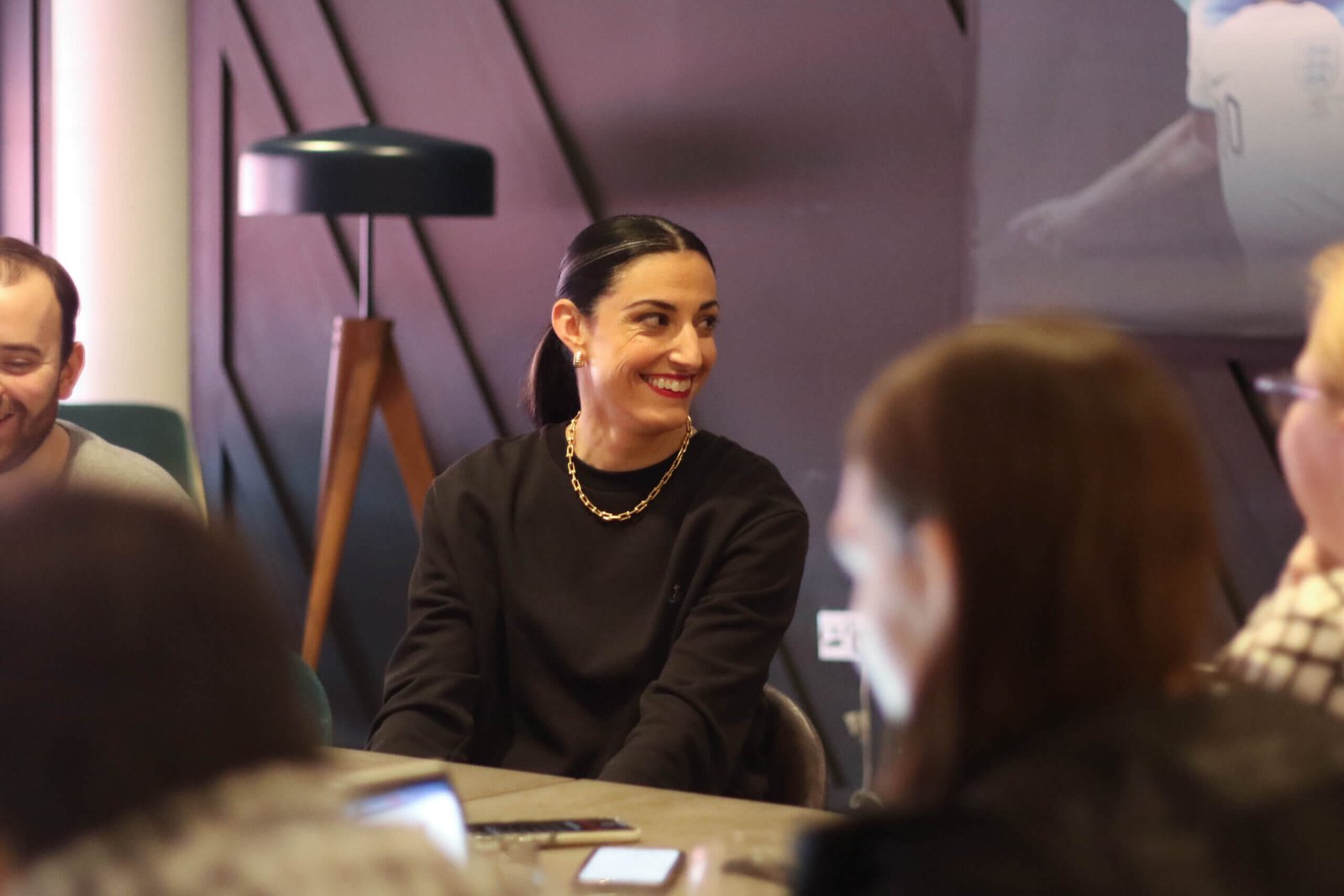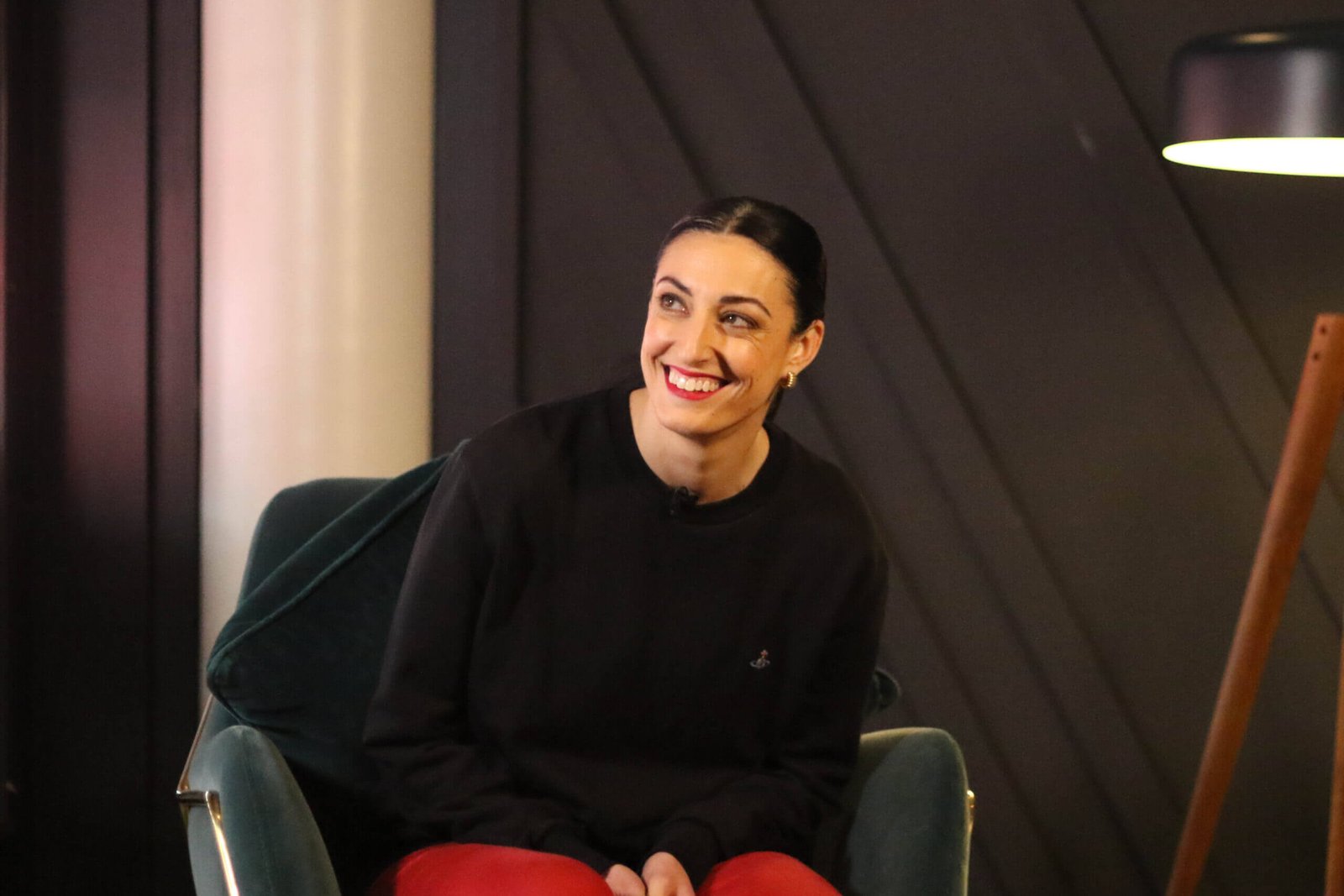Black sweater, red trousers, pink nails. The new CEO of the women’s professional game, her black hair scraped back into a neat ponytail, sits at a table in one of the Football Association’s boxes overlooking the Wembley pitch.
Nikki Doucet, a former Nike employee and basketball player for Canadian university St Francis Xavier, does not look like a stereotypical FA suit.
She does not think like one either.
When Doucet worked at Nike, they would never talk about their competitors. Instead, they asked themselves where the consumer was going next. In effect, they sought to imagine what did not yet exist. Those projects were called ‘moonshots’.
In November the Women’s Super League (WSL) and Women’s Championship (WC) eventually agreed to ‘Project Moonshot’, a proposal which will see a new company (NewCo) taking over the running of the women’s professional game from the FA from the 2024-25 season.
Doucet sees NewCo as “a start-up (working to a backdrop of) 100 years of men’s football history”.
“We’re going from — and I don’t mean this disrespectfully because we would not be here without the FA — being a cost-centre within a governing body to a stand-alone, revenue-generating for profit, independent entity with a 100 per cent dedicated professional management team that wakes up every single day thinking about this project, fanbase, clubs and how we are going to grow this,” she said.
The Athletic was in attendance for Doucet’s first media appearance as, amid plenty of marketing jargon, she offered some pointers as to her vision for the women’s game.
What did we learn about the immediate future of the WSL and WC?
NewCo, and there will be a new name, is on track to launch this summer.
The main priority is to complete the legal documentation to enable the transition of the leagues from the FA into the new independent company. Only when that is complete can Doucet start to implement her strategy.
The WSL and WC will remain in their existing format for next season. That means no expansion of the number of teams this year, and it will remain an open league with promotion and relegation. The Continental Cup will remain, too.
When asked about the potential for expansion in the future — for which several WSL managers, including Emma Hayes, have called — in five or even 10 years’ time, Doucet said: “That’s something we’ll look at. The players are definitely saying we’re at capacity. Right now we need to focus on the foundation; what’s working, and how to make that better.
“If we set up the right decision-making processes, it then makes sense to all stakeholders and parties.”
What will NewCo look like?
Clubs will own NewCo and the FA will have a golden share, like they do in the men’s Premier League. Doucet could not confirm, or was not willing to disclose, where the money is coming from. Neither would she be drawn on the Premier League’s involvement, how much of a share the FA will have or their voting powers, or the make-up of the board.
These gaps in information are significant.
The Premier League was reportedly interested in running NewCo, but no official proposal has been made. Some reports said that the FA asked the Premier League to provide an initial payment of £25million ($31m), but it is unclear whether this was in exchange for any rights or ownership in NewCo. Recent reports also nodded to investors/private equity firms from the United States being interested. Doucet declined to comment on those topics.
Regarding the golden share, Karen Carney’s government review noted that “the level the FA is looking to retain goes beyond that present in the men’s game”. The report recommended that the FA “ensures that these reins are not too tightly held”.
It was thought the NewCo board would be independent with the FA taking a seat, but without club representatives. Some decisions would then be devolved to clubs. The concern is that smaller clubs not affiliated to Premier League sides would not have their voices heard.
Doucet maintained that the smaller clubs will continue to be involved in NewCo and acknowledged there are “different strategies for both leagues… because they’re at different phases of their development”.
“But a successful Championship also means a successful WSL and vice versa,” she said. “They’re interconnected. We’ve had the input from all clubs. We’re trying to make sure the structure enables the ‘investability’ going forward.”
It sounds like there is a lot still to be figured out. Does Doucet have one overriding priority?
“Yes — the fanbase,” said Doucet. “We are still learning so much about this fanbase. If we understand that better, we will create better partnerships and better infrastructure for the clubs and players. It is understanding our audience.”
NewCo is using data to help inform their decisions and implement change. Doucet’s ‘audience first and players second’ approach is an interesting stance given Leah Williamson’s warnings regarding the “unsustainable” football calendar, but she has evidently listened to the players’ thoughts. She insisted she has had “a lot of conversations personally with players” and “their voice is really important”, even if there is no formal regular meeting point established at the moment.
Fans of the Manchester United women’s team at Stamford Bridge last weekend (Ash Donelon/Manchester United via Getty Images)
Doucet also referenced refereeing as one of the priorities. “The better the refereeing, the better the product itself,” she said. NewCo are looking at VAR, but it is first a question of prioritising investment — stadium infrastructure and the issue of frozen pitches cropped up — which feels a logical approach.
Was there any update on television rights? These go out to tender in early 2024, with the leagues’ broadcast deal with Sky and the BBC expiring at the end of the season…
Not as such. “We’re in the market now,” said Doucet. “We’ve gone (out to tender after) the Premier League and the EFL. We’re having conversations with broadcasters now.”
Doucet’s biggest takeaway is that “fandom is in its infancy” in the women’s game so she has to make “it as easy as possible to watch the league”.
“Even if you’re a purist, you’re probably still a new women’s football fan. Even if you’ve watched Arsenal for years, you might only have gone to the Emirates for the first time last year or this year. It’s a new experience.”
She must balance reaching as many fans as possible with earning revenue. Thinking about the broadcast deal in that context suggests Doucet wants as many eyeballs on the product first before considering putting it behind a paywall completely.
What about independent investment?
“One of the concepts within NewCo is to create a business model going forward that encourages more clubs to invest,” said Doucet. “That’s arguably the biggest thing that has to happen.
“We want to make sure that we have as many clubs as possible and they all see a future where they’re either making a return on that money or they see the enterprise value of their club going up. We are looking at what makes the league financially sustainable in the future. I’d say all clubs are aligned with the concept of an investable structure.”
She has been impressed by what North America’s Professional Women’s Hockey League and Angel City FC have done in terms of their business models, investment and marketing.
“Our opportunity here is fascinating because we have more clubs that don’t have independent brands,” she said. “We have global brands and that’s the ‘unlock’. This is an end proposition. It’s not taking from anything.”
What is the scale of ambition?
The sky is the limit. Unlike the current WSL and WC chair Dawn Airey, who predicted the WSL could be the first billion-pound women’s football league in the world, Doucet, a former investment banker, did not want to restrict NewCo’s value.
She believes if the purpose, people, product and process are right, profit will naturally follow.
“Are we setting up the right strategy? Getting people making the right decisions? Analysing the data properly? Obsessing about the athletes and fans and what the clubs need to be successful? If we’re doing that, why couldn’t it be bigger?
“Whatever growth metric you look at — in isolation without the judgement of a direct comparison to men’s football — you’d look at those stats and be like, ‘Holy s**t, this is a high-growth tech start-up’.
“Our opportunity is to create independent decision-making, free of the judgement and all our lived perception of men’s football and the KPIs which make that successful.”
Viewing women’s football in its own right is a huge culture and mentality shift.
“The journey clubs have gone on is also a realisation that what has made men’s football successful will not be the same as (what) makes women’s football successful,” she said. “It’s a different and distinct product (with) a unique audience.
“Our role is to figure out what the different business model is to men’s football. Clubs are learning more about how to connect with their own fanbases. I see this as an end proposition. We’re not taking market share from men’s football. This is a new audience and clubs are seeing that, if they can unlock it, their enterprise value should go up.”

Doucet meets journalists at Wembley (The Football Association – Women’s Pro Game/Nina Farooqi)
Why did Doucet want the role in the first place?
With a Mia Hamm poster adorning the wall, Doucet watched the USWNT win the 1999 World Cup in her university dorm room in Antigonish, Nova Scotia, Canada.
“This is my passion,” she said. “I see a world where women’s sport, and women’s football in particular, changes the world. I believe in the power of sport, and I have seen what it has done in my life for me personally. If you look at women’s sport over the last 50, 100 years, it has just been underfunded. It has been treated like a charity and expected charity returns.”
With professional management and investment, Doucet sees women’s football in the UK as “viable” and “the most amazing opportunity”.
“The experience of going to a women’s match is more like Glastonbury — it’s a festival experience,” she said. “Who doesn’t want to be part of that? This league is the future.”
Only time will tell how much substance there is to Doucet’s new style.
(Top photo: The Football Association – Women’s Pro Game/Nina Farooqi)
Read the full article here


